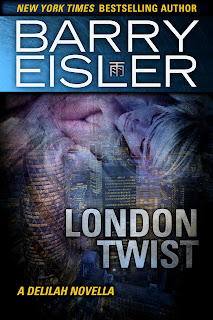Hi everyone, I’m beyond excited (what is beyond excited, anyway? Ecstatic? Delirious? Orgasmic? Maybe all of the above) to share two big announcements today. First, my new Delilah novella, London Twist, is available at last; second, my publishing contracts for my first eight novels have been amicably terminated and all rights reverted to me!
Here’s more about London Twist, published by Thomas & Mercer and available exclusively from Amazon (and available in the UK Kindle Store, too):
For Delilah, the Mossad’s top seductress, the parameters of the assignment were routine. The contractor: MI6. The objective: infiltrate a terror network, this one operating out of London. The stakes: a series of poison gas attacks on civilian population centers.
There’s just one wrinkle. The target is a woman—as smart, beautiful, and committed as Delilah herself. And for a cynical operative thrust suddenly out of her element, the twists and turns of the spy game are nowhere near as dangerous as the secrets and desires of the human heart.
This story is approximately 36,000 words—the equivalent of about 145 paper pages. It is a novella, not a novel.
And hey, no skipping to the dirty parts.
For now, London Twist will be available exclusively in digital. Here are my reasons why, along with information on how to read the novella if you don't have a Kindle.
As for the first eight novels, I’m thrilled to be publishing them with the titles and covers I’ve always wanted. Why have I changed the titles and covers? I thought you might ask...
What’s really great is that with my rights reverted, the Rain books will finally be available in digital outside the United States. This is a huge win for Rain fans in the UK, Australia, New Zealand, and elsewhere—especially at a price of US$4.99 (or foreign currency equivalent). If you care about more people reading, as I do, then you’ll want books available everywhere, at low prices, as soon as possible, in as many formats as possible. Anything else comes at the expense of readers, authors, and the general public. There’s a better way, and I’m proud to be part of it.
Stay tuned for one more big announcement in the coming months—I’m busting to tell you more, but for now, mum’s the word. Thanks as always for all your support and for enjoying the stories!
Barry

























